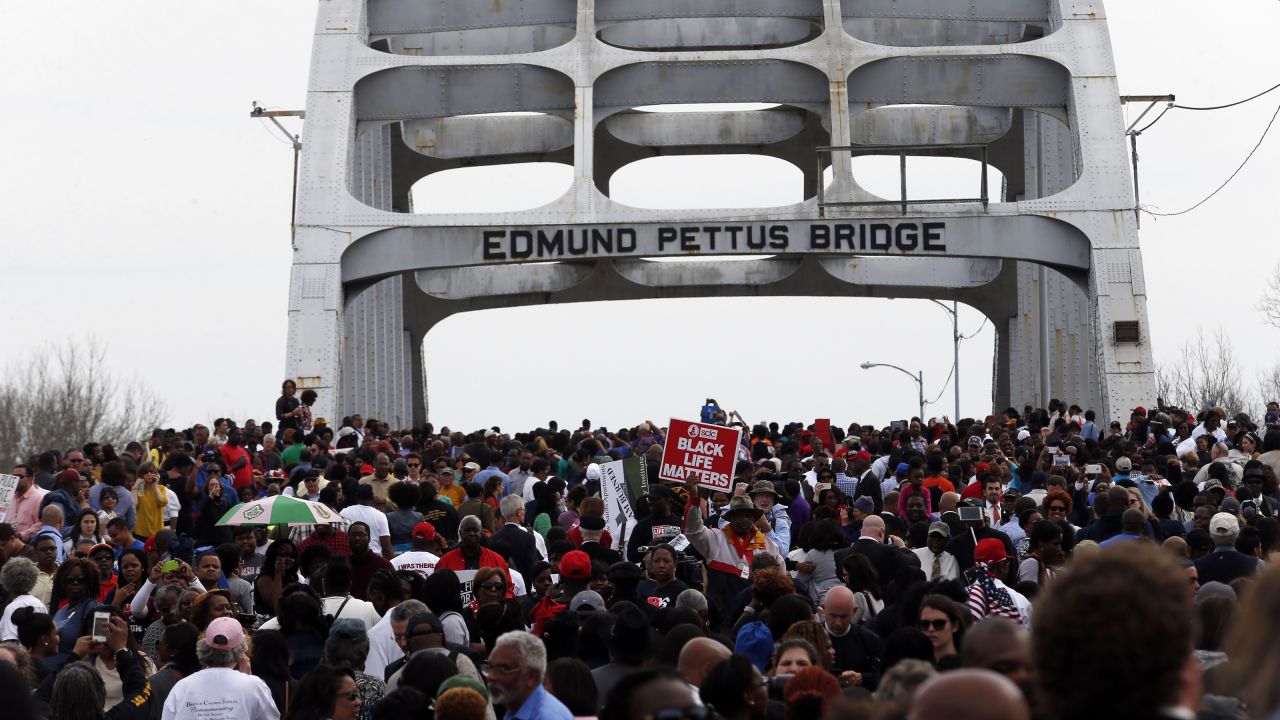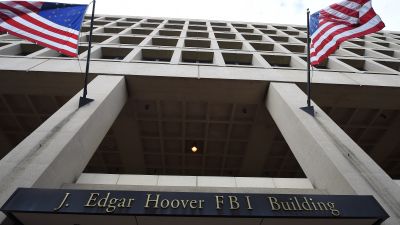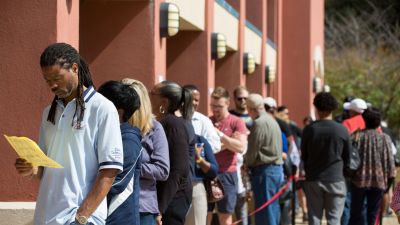
On March 8, 2015, Marchers retraced the steps of those who marched with Dr. Martin Luther King Jr., and John Lewis, 50 years before over the Edmund Pettus Bridge in Selma, Alabama. (Photo by Jessica RinaldiThe Boston Globe via Getty Images)
When the horse-drawn wagon carrying the body of Rep. John Lewis began to make its way up the Edmund Pettus Bridge, it felt like there was a stirring of the ancestors, those in that “great cloud of witnesses” whose spirits are ever with us and who were with a young John Lewis the day police officers nearly killed him for daring to march across the bridge as part of the work to get black people the right to vote.
Many, myself included, broke down as that wagon moved slowly across the bridge strewn with red rose petals to remind everyone of the blood that was shed by many on that day, especially and including the man in the casket.
The journey from Brown Chapel AME Church to the bridge is not a long one. Those who left that building on that day in 1965 knew that they faced harm and danger as they began to move out, after praying and singing. I don’t know how many in that group had been trained in nonviolent direct action, but Lewis had been. He knew that in that movement, he had to be ready to be beaten, be arrested, and/or to be killed. Rev. Jim Lawson had taught him well.
So when Lewis and Hosea Williams led the 400 or so people on that trek across the bridge and the police began assaulting the peaceful assembly with batons and tear gas, they were prepared. Blood fell on the bridge as marchers were beaten, sprayed with tear gas, and nearly trampled by horses, proof of the disrespect that was being shown to God and to the fight for justice.
That John Lewis practiced nonviolence, in the most violent of situations, bound him to the ancestors throughout life as he was often beaten to try to shut him down. Many of them, too, had been beaten – physically, socially, and emotionally. They knew the journey. On that day, they were with him, whispering to him, encouraging him, perhaps leading him to hum a song for strength. They kept him, even as a police baton cracked his skull.
So when he crossed that bridge for the last time, the wheels of the wagon rolling over those rose petals, even as the wagon-driver stood up and took his hat off to honor Lewis’ sacrifice and physical pain he endured on March 5, 1965, it was not difficult to feel how even the ancestors showered love on and showed respect for this man, nodding their heads in approval of his life and work. It was then that it occurred to me that blood which is shed for worthy causes has a different scent, one which lasts forever. On that bridge and elsewhere, Droplets of Lewis’ blood will forever sprinkle on that bridge, sweetened, perhaps, with the scent of crushed rose petals.
W.E.B. DuBois once said that the religious life of Americans “did not begin in America because it was built…on the religious heritage of Africa.” DuBois said that the Black Christian church which came to be in this country was not Christian, but African, placing a “veneer of Christianity upon the ongoing adaptation of indigenous African and beliefs under slavery.”
The ancestors kept us all connected, the “earth family” to the “cloud family.” The Yoruba of Africa “believed in God [and] made that divinity the foundation of organized political belief and state-building,” DuBois said. Throughout the history of black people in this country, the ancestors shared their very breath with those who fought against hatred and bigotry, their breath giving the children on the ground the strength they needed to carry on. The ancestors reminded the children on the ground that over their heads there was a God. They let them know that the scent of their blood had reached the nostrils of God and that God was with them.
The ancestors let the children know …that they were not alone.
The rose petals on the Edmund Pettus Bridge were a reminder that blood had been spilled, and that their scent would forever reach the nostrils of God. The scent of the blood spilled by all of us ever reaches God. On Sunday, the wheels of the wagon carrying Rep John Lewis’ body crushed some of the petals, but neither the wheels nor the wagon was able to crush the scent of suffering; it cannot be erased or diluted. God is and has been the foundation of our organized political belief, as DuBois noted, and God will not only always see our suffering but will also smell it and in response, send the Holy Spirit to strengthen us for the work.
Amen and amen.



